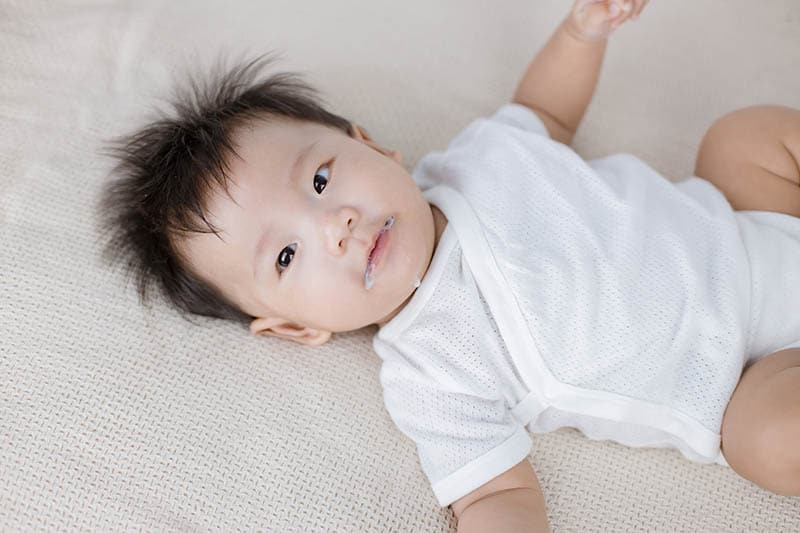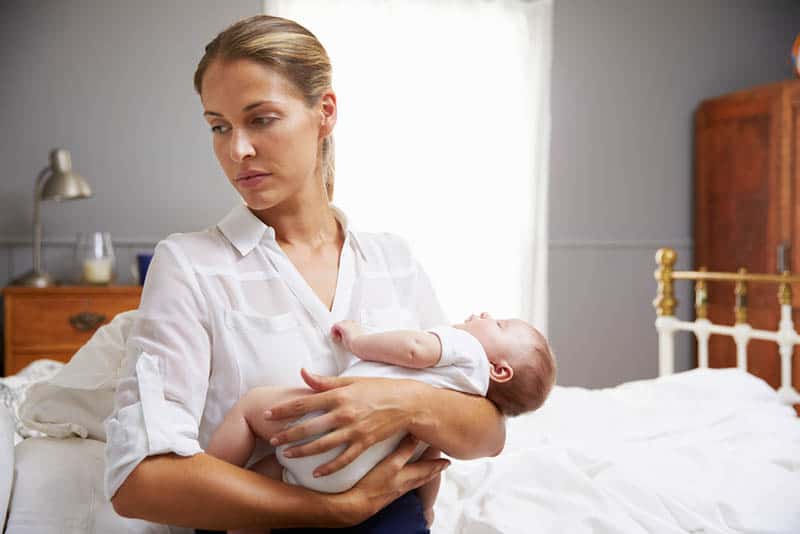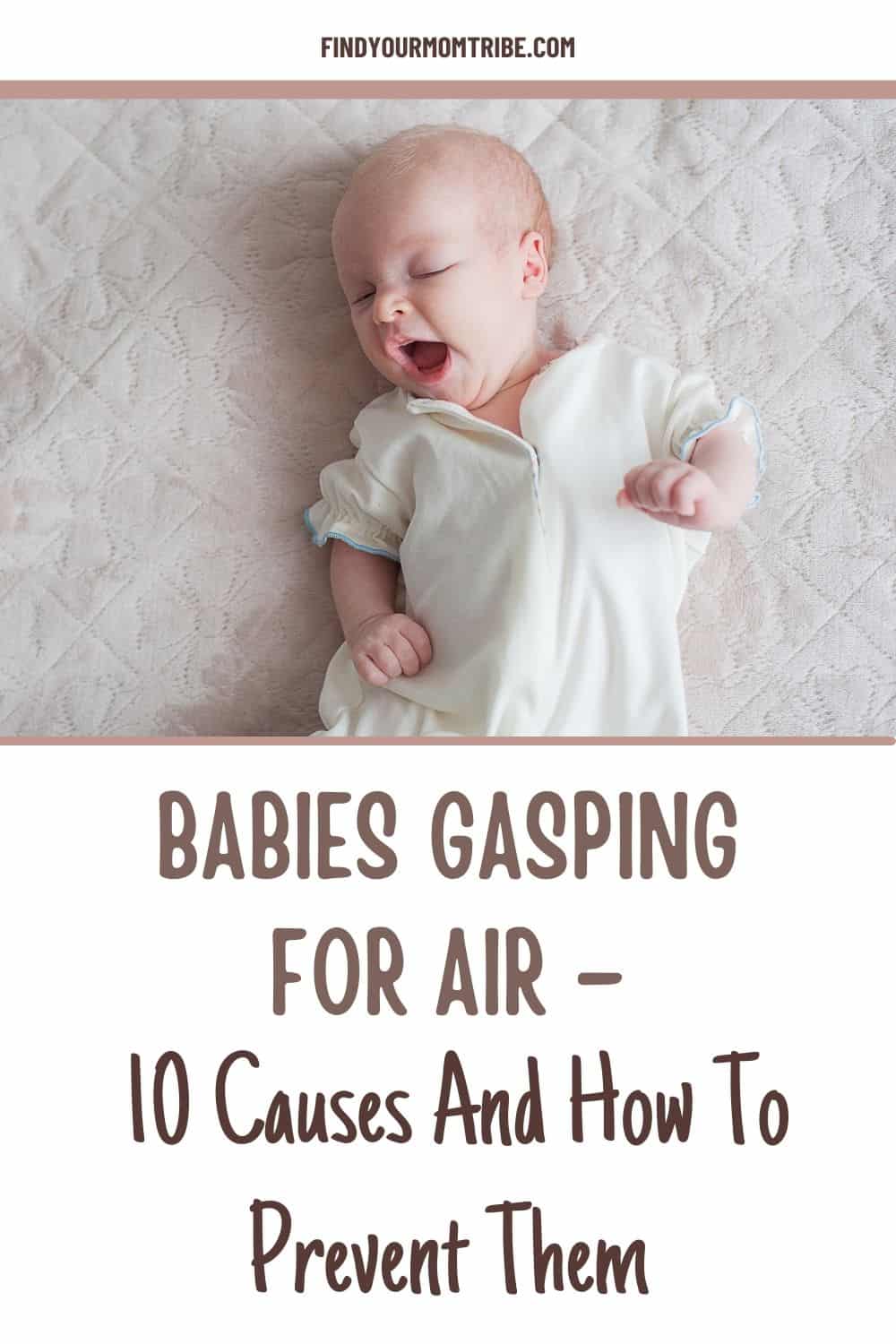Caring for a newborn, especially when it’s your first child, is a huge challenge for any parent, and not only because of the baby, but also due to all of the potential problems that come with kids that can be quite alarming, like babies gasping for air.
When faced with babies gasping for air or general difficulty breathing, the cause can range from a temporary case of the hiccups to a serious problem like asthma, and working out which it is is the hardest part of all of this.
While calling for pediatric help every time there’s a problem is advised, it’s worth noting when it’s just a temporary scare and when it starts becoming a serious issue based on the symptoms.
The most common breathing problem tends to be mucus obstructing the airways, especially during flu season when the common cold is running rampant and your child is bound to pick it up from daycare, kindergarten, or somewhere else.
If there ever seems to be any difficulty in that regard, it’s most likely the fact that your child hasn’t encountered an issue like that before and he hasn’t learned how to deal with it yet.
Though, there are some serious problems which do warrant a visit to the doctor that shouldn’t be ignored, like asthma and infections of the upper respiratory tract, etc. that might cause your baby distress.
Read on to find out everything you need to know about them in more detail and how to deal with each specific issue.
What Is The Cause Of Babies Gasping For Air?

As mentioned earlier, the reasons for a baby gasping for air can be anything from harmless mucus common during flu season, all the way to serious infections that need immediate medical attention like bronchitis, laryngomalacia, etc.
Let’s break them all down.
1. Your baby is a preemie
As we’re already on the subject of preemies, it goes without saying that children born before their designated term are more likely to have issues breathing normally.
This is due to the fact that their respiratory system hasn’t developed properly yet and is likely to cause them several issues for a while.
It’s usually one of the reasons infants born prematurely need to stay in the NICU ward .
Luckily, the issues stemming from being a premature baby will resolve themselves with time as the body develops, but it’s worth noting that you need to be careful with premature children to ensure their utmost comfort and safety.
If you see him having issues with breathing that keep getting worse, or if he doesn’t continue breathing normally after some time, call your pediatrician immediately so they can intervene and help before things get really bad.
2. Large mucus buildup

Because children are smaller, some of their organs are not yet fully developed.
This means that something which might not pose too much of an issue for an adult (like mucus from being sick) can be a big problem for babies.
The biggest culprits of snot and mucus buildup come from colds, allergies, and even asthma and infections of the upper respiratory tract.
That said, this still shouldn’t cause too much of a change from regular breathing patterns, but if you do notice your little one struggling to breathe, don’t hesitate to phone your child’s pediatrician for some medical advice on how best to proceed.
They’re likely to ask you to make an appointment so you can bring your kiddo in for a check-up and pinpoint the exact cause of the issue, as well as how best to deal with it.
While you’re at home though, the best way to get rid of snot and mucus and help a child who has trouble breathing, is by using a nasal aspirator to help clear his nostrils.
3. A whooping cough (pertussis)
Whooping cough can be a really annoying issue for your baby to deal with, but it isn’t too dangerous unless it’s happening at night.
The main symptom you are likely to notice are the short periods of time where the baby can’t breathe due to a sudden outburst of violent, dry coughs, much like bronchitis.
The reason for the name “whooping cough” is specifically because of the way the cough sounds, producing a “whooping” sound.
However, whooping cough can be accompanied by symptoms like fever, vomiting from straining the larynx, watery eyes from irritation, and general congestion.
Thankfully, there are vaccinations available for the prevention of whooping cough for all age groups.
4. Issues breathing during feeding periods

Whether it’s breastfeeding, bottle-feeding, or eating solids for the first time, some babies haven’t yet gotten into the proper pace of breathing while eating, leading to babies gasping for air during feeding times.
Usually babies take a breath, feed, swallow the food and then continue, an audible exhale usually following after each time.
It can also be the sign of some underlying issue, but usually it’s just a pace thing that will resolve itself as the baby learns.
5. An upper respiratory infection
The various infections of the upper respiratory tract can be really nasty to deal with for adults and children alike.
Pneumonia and bronchitis are the absolute worst offenders likely to require proper medical attention so they don’t develop complications.
These two are the most likely causes of your baby gasping for air, among other symptoms that make the duration of the infection a real pain to deal with.
For pneumonia, children might experience some chest pain and feel like their lung capacity has been lowered, making it harder for them to breathe.
Bronchitis, on the other hand, makes it difficult because of the persistent cough that agitates or even hurts the trachea and the bronchial tubes, often to the point where normal breathing becomes difficult.
It all turns into this raspy, noisy breathing or grunting instead.
For the sake of child health, should your little one complain about similar symptoms, make sure to contact your doctor immediately for further action, because if things like pneumonia are left to linger too long your child may end up needing a stay at a children’s hospital.
6. Sleep apnea

The main symptom of sleep apnea is a sudden pause in breathing during sleep which, as you may have guessed, is quite dangerous.
It’s also a condition that isn’t strictly limited to babies that are a month old or so, it can happen with older kids as well as teenagers and even some adults.
What causes these issues is the blockage of the airway and the throat tissue being a bit too soft. This is also referred to as obstructive sleep apnea.
Another reason could be some sort of malfunction or damage to the brain stem, where the designated signals for passive breathing simply stop for a brief period of time.
The latter is a lot more dangerous because nerve damage is still irreparable, but it’s not the end of the world as there are still ways around it to ensure a sound sleep without having to worry about any potential issues.
For that, you’ll need to get a breathing machine to help your child breathe while he sleeps.
That said, before jumping to any conclusions yourself, make sure to book an appointment with a doctor so they can perform a sleep study if need be.
7. Laryngomalacia
Laryngomalacia is a condition similar to sleep apnea except it affects the area around the vocal cords.
Much like sleep apnea, the result of this problem is young babies gasping for air.
The other symptom you may notice is a squeaking sound due to the soft tissue blocking the airflow whenever they attempt to speak.
There’s also the added problem of poor weight gain due to the condition, something that’s more common in preemie babies, but which can also affect children carried to term. It also ties into difficulties with breastfeeding.
That said, this issue usually only affects young babies due to an underdeveloped throat, and fixes itself by the time the baby is 9 months old. If not, it will require further medical attention and advice from a qualified professional.
Also, don’t take the number of months to heart; allow your doctor to make the diagnosis as some children may take more or less time for it to clear up depending on how it developed.
8. Second-hand smoke

Cigarette smoke isn’t just harmful for your own health, it’s also harmful to a baby’s breathing.
Second-hand smoke inhalation and general proximity to it can lead to a number of issues in children, like strep throat or an increased chance of ear infection on top of difficulty breathing.
The respiratory distress only gets worse when piled on top of any other problem that might cause your baby to gasp for air.
If you’re an avid smoker, my best suggestion is that you smoke outside and far away from your child so the smoke doesn’t linger inside a room, as well as changing shirts when you’re done so the child doesn’t have to inhale any absorbed smoke.
9. Asthma
Asthma isn’t just a medical condition that affects older children and adults, plenty of young children are diagnosed with it too, and your child may be one of them.
I’m not saying that it’s likely, but you shouldn’t exclude any possibility when your child’s health is concerned, and getting it diagnosed early can help deal with the symptoms and help your child live a normal life.
Sure, an inhaler might be necessary for more severe cases, but it’s a lot better than the other alternatives.
Once again, any difficulty breathing should be reported to your child’s doctor, especially if it persists.
10. Gastroesophageal reflux

Another common issue which may lead to babies gasping for air is acid reflux.
This isn’t something that’s an issue with the respiratory system itself, but rather the baby’s digestive tract.
A weak or underdeveloped lower esophageal sphincter causes weaker retractions, so the stomach contents will often come out in the form of the baby spitting up after eating, alongside some stomach acid which irritates the throat.
This can make it difficult to breathe for some infants because of both the burning sensation in the throat after and the frequent spit-ups which break the regular breathing pace.
This condition usually goes away on its own by the baby’s first birthday, though they could also have a more severe form of it called Gastroesophageal reflux disease (GERD), which may require corrective surgery to fix.
Luckily, proper positioning of the baby and swapping to a specific type of acid reflux baby formula can help ease the symptoms and make life easier for your baby.
How to ease reflux symptoms
1. Properly positioning the baby
While most babies spend a lot of time in a lying position, this will only exacerbate the symptoms for those with reflux.
In order to prevent this, keep the baby in your arms with his head up and at an angle so he’s not fully on his back, but so he can also still lean onto something.
Eating periods are the same too, when you’re done breastfeeding or bottle-feeding your baby, keep him upright for a while longer to help him keep the food down and prevent spit ups from happening entirely.
If the baby is leaned down, the sphincter is more likely to fail and lead to a flare-up in reflux.
You should keep the baby in your arms at a slight angle for at least half an hour after feeding to allow the food to settle before letting him rest.
While the habit of letting him fall asleep in your arms may not always be the best, it’s a small sacrifice to make for his overall health.
The same applies to the baby’s sleeping arrangement.
That said, nothing else should be in the crib with the baby as it greatly increases the risk of SIDS.
Anything extra requires approval from your child’s pediatrician.
2. Swapping to food that agitates the stomach less
Sometimes a change in diet can help ease the symptoms of acid reflux.
Luckily, some baby formulas provide a solution as a lot of them have been developed to deal with specific problems children may have.
Depending on the cause of the issue, there are formulas which help deal with infantile lactose intolerance and other potential food allergies through hypoallergenic mixes of non-GMO formula.
One such brand is Enfamil, specifically Enfamil Neuropro Sensitive, which caters to more sensitive stomachs to help reduce spit ups.
3. Try gripe water
Gripe water is a natural remedy that helps fussy babies dealing with colic and can also ease symptoms of reflux, helping them breathe a bit easier.
It works by relaxing the digestive tract, allowing the symptoms to die down and giving your baby an easier time.
That said, it’s more a part of alternative medicine and shouldn’t be taken over more proven and tested medication.
What Else Can Be Done To Help My Baby Breathe Easier?

While it is a bit of an investment, purchasing a humidifier for the baby’s room can be a great help.
The extra humidity in the air can help break down mucus and allow the baby to breathe and sleep easier.
It’s great for dealing with allergies too, and will help adults just as much as babies, so if you can afford it it’s worth giving it a go.
Believe me, I have one and it does wonders for my spring allergies!
How Do I Know Whether It’s A Serious Condition?

In the case of your baby having difficulty breathing, any condition is a potentially serious condition, though you shouldn’t take a brief cough or sneeze as a concrete sign of it.
You should be on the lookout for the more obvious signs of a more violent cough, wheezing, squeaking, or similar.
Your doctor is there to help so don’t be shy or afraid of ringing them up whenever you’re concerned about your child’s health.
The more obvious reason to call a doctor is if your child’s lips or face ever start changing color to blue or purple, which is red alert territory.
Any of the aforementioned reasons will always require a check-up and a proper diagnosis and, unless you’re a doctor yourself, is something that you can’t really do, so it’s best to leave it to the professionals.
In Conclusion
Seeing babies gasping for air is always a cause for alarm, even if it ends up being something harmless.
If left unchecked, it can lead to some severe and potentially fatal complications so it’s always better to be safe than sorry.
That said, if your baby is diagnosed with a breathing problem, don’t be alarmed, there are ways to treat and remedy most of them, and those that can’t will either go away naturally or have means of easing their symptoms.
Just make sure you keep an eye on your kiddo for signs of any difficulties breathing and have a phone ready to speed dial your child’s pediatrician, and you should be okay.
Until next time, mammas!
Like this post? Please share or pin it for later. You can also stay in the loop and follow us on Facebook, Instagram or Pinterest.

We love honesty! Find Your Mom Tribe is an Amazon Associate and we earn from qualifying purchases through affiliate links at no extra cost to you. Please see our full Amazon Affiliate disclosure for more information.

